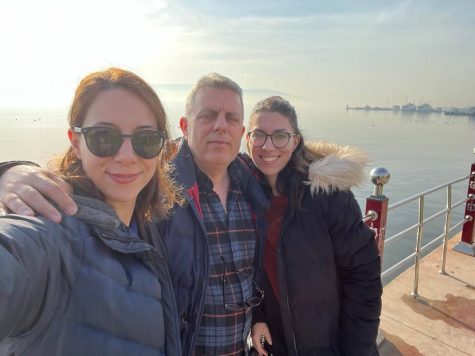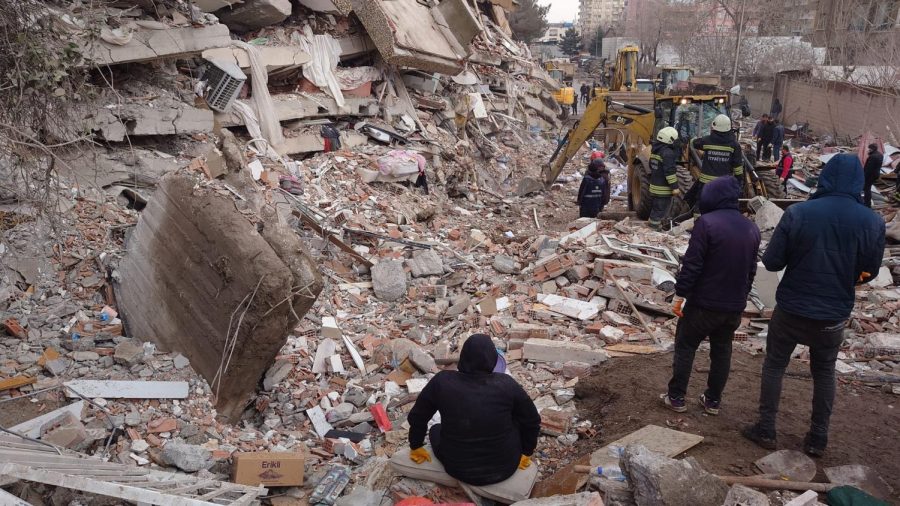WSU students and faculty reflect on Turkey-Syria earthquakes
Turkey and Syria residents frustrated with government promises on earthquake safety
COURTESY OF VOICE OF AMERICA / WIKIMEDIA COMMONS
A magnitude 7.8 earthquake struck the south-eastern part of Turkey near the border of Syria on Feb. 6.
March 7, 2023
When Mesut Cicek was on the phone with his sister she paused what she was saying to let him know that they were experiencing another minor earthquake. The shaking of the walls and floors were becoming more of a ritual in his family’s weekly routine in Turkey.
Many WSU students and faculty members hailing from Turkey are still feeling the aftereffects of the earthquakes that hit Turkey and Syria on Feb. 6. Currently, the official death count is greater than 45,000 people, according to the BBC.
On Feb. 6 at approximately 4:17 a.m. local time, a magnitude 7.8 earthquake struck the south eastern part of Turkey, near the border of Syria. This first earthquake then triggered a 7.5 magnitude earthquake about nine hours later. The area has since been experiencing smaller earthquakes and tremors triggered by the first quake, according to the BBC.
Cicek is an assistant professor in the Department of Marketing and International Business at WSU. Raised in the western part of Turkey, both of Cicek’s parents as well as his two sisters still live there. One of his sisters lives in Kayseri with her husband and children, a city in central Turkey that has been experiencing aftershocks due to the earthquakes.
He said that even though a month has passed since the original earthquake and Kayseri was not directly hit, his sister and her family still feel unsafe as they have been feeling the aftershocks and smaller earthquakes throughout the past few weeks.
“I feel like I can’t do enough for them,” Cicek said. “Whatever I do, I don’t feel like it’s enough.”
Cicek, along with other members of the WSU community, has been donating food, money, and clothes for aid relief following the earthquakes. But he still cannot stop himself from feeling guilty and uncomfortable after seeing and hearing what the earthquake victims are going through, he said.
“Even when you smile, you feel guilty. When you eat something, you feel guilty. When you are warm, you feel guilty,” Cicek said. “Because you think about millions of people who are outside in the cold freezing.”
Over 200,000 buildings have collapsed, including new buildings that claimed to have been built with earthquake safety regulations, according to the BBC article. As a result, millions of people have been left homeless or displaced, with many people fleeing to live with family in other parts of the country.
Those who have nowhere to go have been staying near the rubble of their destroyed homes, in the hopes that their family members might be rescued from the rubble. Some people have also been living in their cars, such as Cicek’s sister, she said.
“It’s worse than you can imagine,” Cicek said. “It’s worse than I can imagine.”
The Feb. 6 earthquake has become the most dangerous earthquake experienced by the country since 1999, according to The Guardian. In 1999, a 7.6 magnitude earthquake hit the Turkish province of Kocaeli, resulting in at least 17,000 deaths.
Following the earthquake in Kocaeli in 1999, the Turkish government promised stricter building regulations and an “earthquake tax” to prevent a repeat of this disaster, according to The Guardian. The destruction that has occurred from the recent earthquakes, 24 years after the government promised increased preparedness, has left many people frustrated and angry.
Sedef Topal, a fifth-year doctoral student studying political science, was a survivor of the earthquake that hit Kocaeli in 1999. Topal was nine years old at the time and recalls the government’s lack of preparedness that she and other survivors were faced with.
“We had to live in the streets for a week because there was no help, there was no aid,” Topal said. “We were just waiting for the government to help us, basically.”

Sedef Topal (left) pictured with her father, Kadir Topal (center) and sister, Sinem Topal (right).
But the government was ill-prepared and unable to provide immediate aid to its citizens because it had never faced such a large natural disaster before, she said. Many people counted on their families and friends to help them recover or give them a place to stay.
“We had a neighbor, and they had a car, and their car didn’t get destroyed by the earthquake, so my parents and our neighbor, they had like three kids, they let me and my sister sleep in their car,” said Topal. “Like four of us sleeping in this small car, and they slept outside.”
Topal said that the government has not learned its lesson from the 1999 earthquake in Kocaeli and that she is frustrated by the lack of follow-through on the government’s part following the promises they made regarding earthquake preparedness and stricter building regulations.
“Nothing has changed since 1999,” Topal said. “People were angry with the current government at that time, and people just took everything out on them because they didn’t have enough help, and now the same thing is happening.”
Cicek and Topal both encourage members of the WSU community to stay informed about what is happening in Turkey and Syria and to donate financially through charities or the Red Crescent which are helping provide relief.
“My call for the WSU community is to donate as much as you can,” Cicek said. “It will be very helpful, even $5 or $10. This will touch some lives.”










